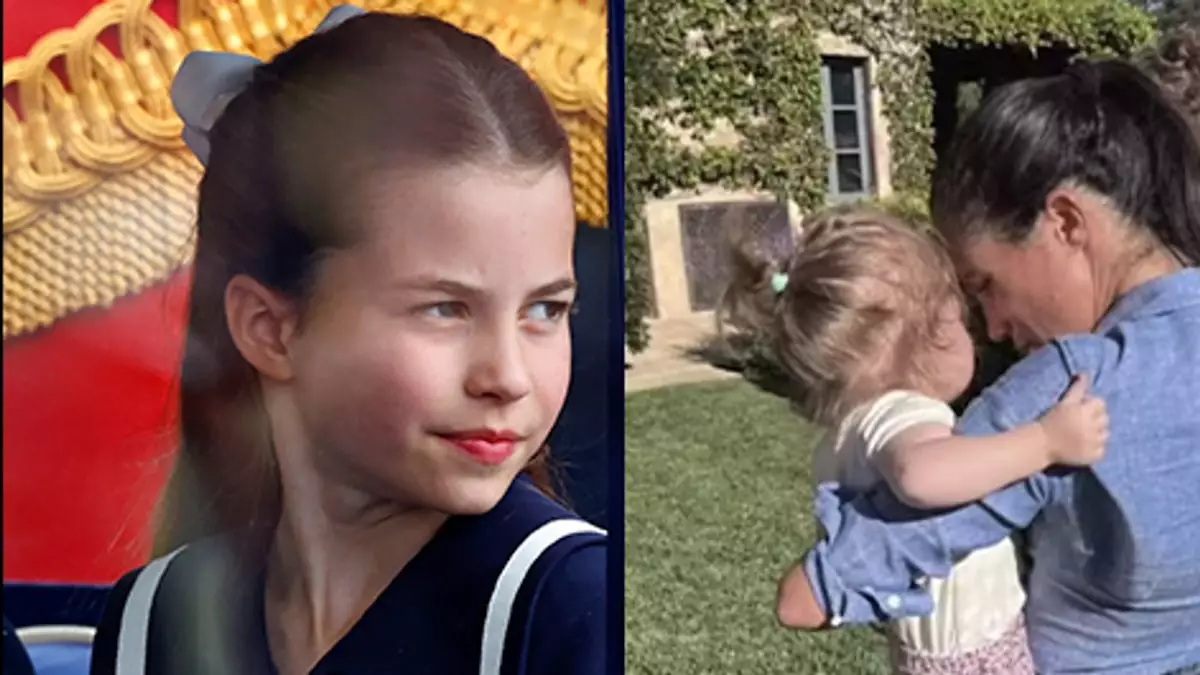The recent unveiling of the Sussex family’s Christmas card has sent ripples of excitement through royal watchers and fashion enthusiasts alike. Featuring a rare glimpse of Princess Lilibet, who captivated us on her first birthday with her striking blue dress, this year’s card introduced us to a heartwarming family moment. It also raises interesting questions about the influence of royal children on fashion trends and how their choices resonate with both tradition and contemporary style.
A Whimsical Attire for a Timeless Look
In the photograph, Lilibet, now three years old, was depicted joyfully running toward her parents, Prince Harry and Meghan Markle. Decked out in an adorable blue floral dress, she instantly charmed those who laid eyes on her. The garment’s aesthetics drew immediate comparisons to a dress worn by her cousin, Princess Charlotte. This particular piece has been identified as the ‘Forget-Me-Not’ floral smocked dress from the renowned children’s designer Rachel Riley, retailing at £119. Not only does this dress represent a timeless choice for young girls, but it also highlights the growing phenomenon of royal fashion influencing mainstream styles.
The designer herself noted the similarities between Lilibet’s dress and the one worn by Charlotte at an Easter Sunday service in 2022. The nostalgic appeal of these floral patterns resonates well with parents seeking both comfort and style for their children. Lilibet’s choice of attire showcases the blend of comfort and aesthetic that is increasingly sought after, especially in the warmer Californian climate.
Interestingly, the fashion choices of young royals often evoke a sense of nostalgia while remaining relevant to today’s trends. Lilibet’s knee-highs, synonymous with British children’s fashion, evoke imagery of her father’s British heritage—a mix of old-world charm and contemporary lifestyle. Rachel Riley emphasized this blend, reinforcing how these fashion choices create a connection with British culture while simultaneously appealing to a global audience.
Moreover, the designer remarked on the strong appeal surrounding royal children and their fashion. The fascination transcends borders, awakening a desire among families to mirror the styles worn by these young royals. Such is the influence that royal children have inaugurated what can be termed the “mini-royal effect”, reminiscent of the earlier “Kate Effect”, which saw an upsurge in sales tied to style choices made by Kate Middleton.
An Investment in Timelessness and Quality
One of the focal points of this particular fashion conversation pertains to the idea of investment pieces. The appeal of cotton floral dresses is not merely aesthetics; they embody practicality paired with endearing charm. Designer Rachel Riley underscored that these dresses are fashioned to last, ideally suited for sustainability by being passed down through generations. This perspective aligns with a larger trend in fashion, where consumers are increasingly seeking quality over quantity.
Rachel Riley’s outfits have been linked not just to fleeting trends but to classic styles that resonate deeply with families seeking to imbue their wardrobes with lasting memories. Families often invest in these pieces not only for their immediate beauty but for the potential stories they carry through generations—a notion that adds an emotional resonance to every purchase.
The royal family’s ability to drive fashion trends is undeniable, especially regarding their young members. The appearance of Prince George, Princess Charlotte, and Prince Louis in designer clothing has demonstrated an ability to prompt remarkable spikes in sales. Such was the case when outfits worn by these young royals frequently sold out due to public interest. Much of this excitement is driven by the “cutest factor” as children’s whimsical attire continues to attract widespread attention and adoration.
As the Sussex family continues to create memorable moments captured in photographs, the fashion choices they make, especially for their children, have the power to influence wider trends and consumer behavior. In seeing figures like Princess Lilibet in classic designs, society remains enchanted, bridging the gap between royal allure and everyday fashion.
The story behind Lilibet’s dress in their Christmas card encapsulates far more than a mere moment captured in time; it signifies an enduring connection between royal life and fashion, reflecting both heritage and contemporary charm. As royal families evolve, their fashion choices will undoubtedly continue to shape trends, inspiring future generations to cherish classic, comfortable, and stylish ensembles.

